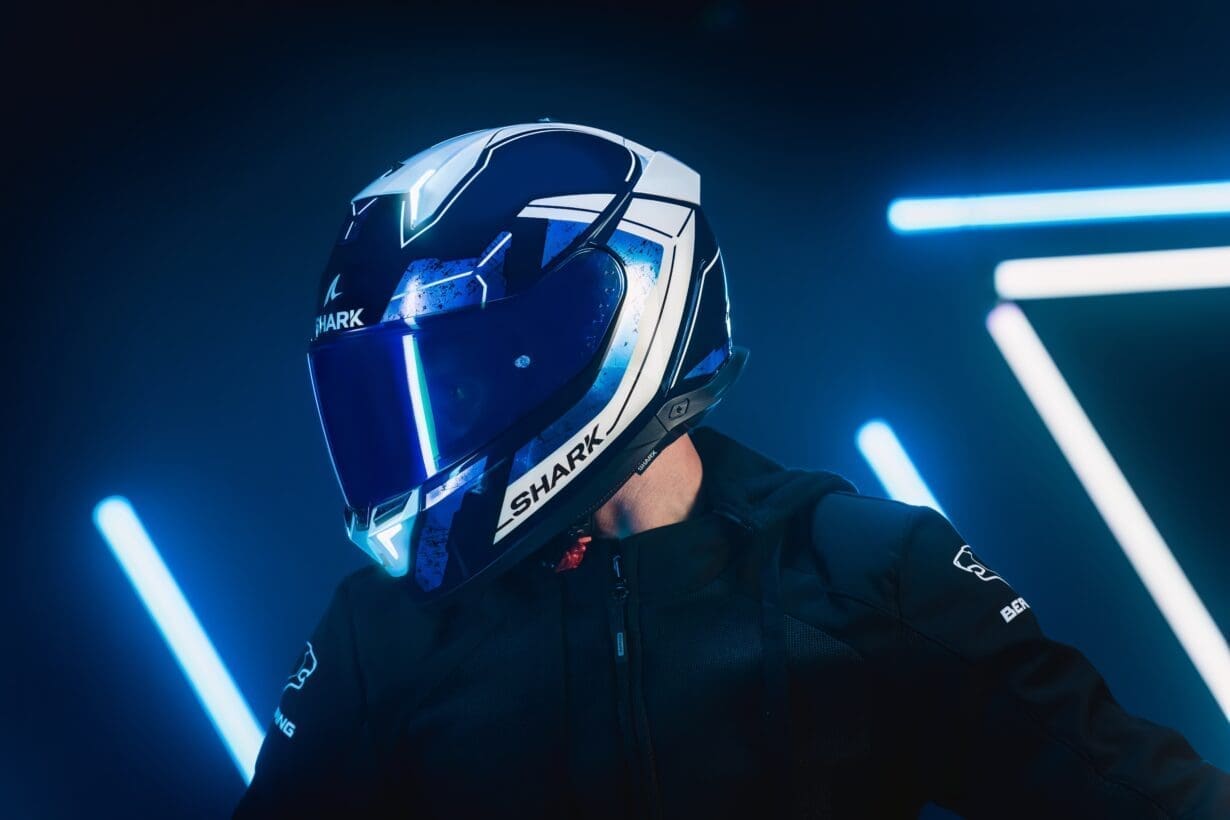SHARK’s innovative Skwal i3 helps you to be seen. Here’s how…
Shark Helmets has built up a solid reputation over its 30-odd years in the game. The French firm started out small, and over the years has established itself as one of the biggest names in the game, continually pushing the boundaries, nipping, tucking, developing, and innovating to create an extensive range of lids that riders want to wear.
One of its latest inventions is the Skwal i3, a seriously clever bit of kit which blends a properly protective ECE 22.06 helmet with some futuristic patented technology to help make you more visible out on the open road.

THE TECH
The integrated active LED brake light at the rear and white LEDs up front are a natty solution to the age-old problem bikers face… Not being seen. It’s cleverly done, too, with no wires or Bluetooth, instead relying on a built-in triaxial accelerometer to activate the brake light whenever you slow down. To help make it clear what you’re up to, the brakes will flash three times per second under steady braking and five times per second under hard braking.
MODES
You can choose how you want it work, too, with three different modes to choose from. You can have the white LEDs on at the front and the red LEDs on the back constantly on, with the smart brake lights flashing when you apply the anchors. You can also set it up so the white LEDs on the front and red LEDs on the rear flash, with the smart brake lights flashing when you’re braking. Or you can opt to have the white LEDs on the front and red LEDs on the back turned off, with only the smart brake lights flashing when you hit the brakes.
CHARGING
It’s not a particularly hungry beast, so if you’re used to sticking your comms unit on charge then you’ll have no trouble with the Skwal i3. Whack the USB-C cable into the mains and you’ll only need to wait for three hours to have 12 hours’ battery life ahead of you. That’s plenty for even the longest day in the saddle. There’s also a ‘Sleep’ mode which kicks in automatically after a couple of minutes of no movement and helps to preserve the battery. After that, it’ll turn itself completely off after 24 hours, too.
CONSTRUCTION
It’s made from a Lexan-injected Polycarbonate shell – and most importantly, it exceeds the latest ECE 22.06 requirements for new helmets. That means it’s well up to the job of keeping your noggin safe, should the worst happen, and you end up trading blows with the Tarmac.
VISION
It’s kitted out with another of SHARK’s patented innovations. A super-quick and easy no-tool visor removal system allows you to whip out the Class 1 anti-scratch visor (with Pinlock 70) in a flash. There are also some Pinlock tension adjustment pins; a proper visor locking system; and an integrated anti-scratch and anti-fog sun visor.
COMFORT
SHARK is renowned for creating comfortable helmets, but to take things even further and make sure yours fits just right, it’s been hard at work on a 3D head scanning campaign. The result is ‘BEST FIT’ by SHARK, which it reckons offers ‘a unique second skin feel’ thanks to its textile inner and multi-density EPS padding. Sounds good to us. There’s also space in there for some 40mm speakers, and as with all SHARK lids, it’s suitable for glasses wearers, too, with space for your spectacle arms in just the right spot.
FANCY ONE?
Starting at £239.99 for the base model, there’s a whopping 13 colour schemes to choose from. There’s plenty of sizing choice, too, with availability from XS right through to XXL. If you want to know even more, visit: www.shark-helmets.com
FIVE MINUTES WITH…
R&D Manager, SHARK Helmets, Christophe Fontana
Why did you decide to add a brake light to the Skwal?
“The original Skwal was launched in 2015 and boasted a world first in boosting rider visibility with the inclusion of integrated LEDs in the helmet. Never content with the status quo, we decided to take active rider safety one step further with the ‘intelligent visibility’ of the Skwal i3.”
How long did it take to develop?
“We started from scratch for this project. Based on security and high-end functionalities we left room for innovations throughout the 30 months of development.”How does it work?
“Same as on a smartphone, the sensor embedded in the helmet detects every deceleration. So, when the rider is braking, the software understands the motorbike’s behaviour and the rear brake light flashes to warn and increase the visibility.”




